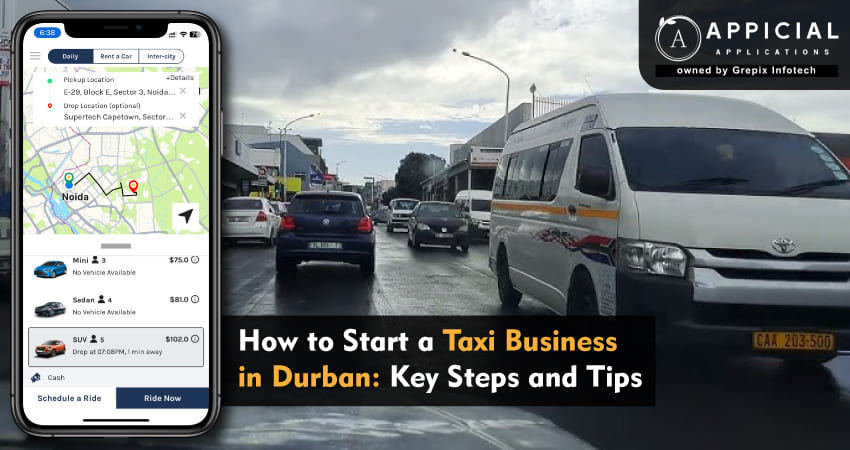
How to Start a Taxi Business in Durban: Key Steps and Tips
Durban, with its bustling streets and growing population, is a hub of activity. With locals and tourists alike constantly on the move, transportation plays a vital role in keeping the city alive. For entrepreneurs, this creates a golden opportunity: starting a taxi business.
Whether you are looking to provide metered taxi services, minibus rides, or join the ride-hailing trend, setting up a taxi business in Durban can be both rewarding and challenging.
Launching a taxi business in Durban is a rewarding venture with the potential for steady income and growth. By following the steps outlined above researching the market, fulfilling legal requirements, and integrating technology. You can set up a successful business that meets the city’s growing transportation needs. Leap, and drive your entrepreneurial dreams forward!
In this guide, we will break down the steps to help you navigate the journey smoothly.
Durban’s vibrant streets and growing population make it an ideal location for starting a taxi business. With high demand from locals and tourists, opportunities abound for entrepreneurs to offer metered taxis, minibus rides, or ride-hailing services. By conducting thorough market research, meeting legal requirements, and integrating technology like mobile apps and GPS tracking, you can build a competitive and efficient business. Focus on customer satisfaction, driver training, and strategic marketing to create a trusted name in Durban's transportation sector. With careful planning and execution, your taxi business can thrive in this dynamic market, meeting the city's growing mobility needs.
Understanding the Market in Bloemfontein
1Understanding the Taxi Industry in Durban
Market Overview
Durban’s taxi industry is diverse, ranging from traditional minibus taxis to modern ride-hailing services like Bolt and Uber. The demand for reliable, affordable, and safe transportation is high, making it a lucrative market for new businesses.
Types of Taxi Services
- Metered Taxis: Traditional taxis with set rates based on distance or time.
- Minibus Taxis: A popular choice for group travel, often used for short-distance commutes.
- Ride-Hailing Services: Technology-driven solutions where passengers book rides via mobile apps.
2Research and Planning
Market Research
Before diving in, conduct thorough market research. Understand who your competitors are, what services they offer, and the gaps you can fill. Also, gather insights into customer preferences, such as affordability, convenience, and safety.
Crafting a Business Plan
A well-structured business plan is crucial for your taxi business success. It should outline your mission and goals, providing a clear vision for the future. Include a detailed breakdown of startup costs, strategies for efficient operations and effective marketing, and projected revenues and expenses to ensure financial sustainability and attract potential investors.
3Legal Requirements
Business Registration
Registering your business is the first step. In South Africa, this involves choosing a business structure (sole proprietor, partnership, or company) and registering with the Companies and Intellectual Property Commission (CIPC).
Licensing and Permits
You need to obtain a taxi operating license from the Department of Transport. Additionally, ensure that you comply with local municipal regulations regarding passenger transport.
Vehicle Requirements
Your fleet must meet specific safety and operational standards. Invest in vehicle insurance and ensure all cars undergo regular inspections to maintain compliance.
4Setting Up Your Taxi Fleet
Choosing Vehicles
Selecting the right vehicles is essential. Choose models that are fuel-efficient, spacious, and durable. Consider whether to buy or lease based on your financial situation.
Maintenance and Safety
Routine maintenance ensures reliability and safety. Keep a strict schedule for servicing your fleet, and equip vehicles with safety features like GPS, airbags, and first-aid kits.
5Hiring and Training Drivers
Recruiting the Right Drivers
The drivers you hire represent your business. Look for individuals with valid professional driving permits (PrDPs) and a clean driving record. Conduct background checks and ensure they have experience navigating Durban’s roads.
Driver Training Programs
Investing in driver training is key to enhancing customer service and driving efficiency. Training should focus on navigational skills using GPS for optimized routes, effective communication to ensure a pleasant passenger experience, and emergency protocols to prioritize passenger safety in unforeseen situations. Well-trained drivers build trust and elevate your business’s reputation.
6Technology Integration
Using Taxi Management Software
Modern taxi businesses rely heavily on technology. Taxi management software can streamline operations by automating dispatching, tracking vehicles in real-time, and providing analytics to optimize performance.
Mobile Apps for Ride-Hailing
Incorporate a mobile app to allow customers to book rides conveniently. You can develop your app or partner with established platforms like Bolt or Uber. Ensure the app is user-friendly and includes features like estimated fare calculation, driver ratings, and live tracking.
7Marketing Your Taxi Business
Branding and Identity
Creating a strong brand identity helps your business stand out. Design a professional logo, choose a catchy business name, and maintain consistent branding across your vehicles, website, and marketing materials.
Online and Offline Promotion
- Social Media Marketing: Leverage platforms like Facebook and Instagram to reach your audience. Share promotional offers and customer testimonials.
- Collaborations: Partner with local businesses, hotels, and events to secure regular bookings.
8Financial Management
Setting Fares
Research competitor rates and establish fares that are both competitive and profitable. Consider providing discounts during peak hours or special events to attract customers.
Managing Cash Flow
Effective financial management is crucial for long-term success. Utilize accounting software to monitor income and expenses. Additionally, allocate funds for unforeseen costs such as vehicle repairs or insurance claims.
Also Read: How to Successfully Launch a Taxi Business in South Africa: The Ultimate Guide
9Challenges in the Taxi Business
Navigating Competition
The taxi industry in Durban is competitive, especially with ride-hailing services. Focus on building customer loyalty through excellent service, reliable rides, and competitive pricing.
Handling Operational Risks
Operational risks like vehicle breakdowns or driver absenteeism can disrupt your business. Have contingency plans in place, such as spare vehicles and backup drivers.
10Growing and Scaling Your Taxi Business
Expanding Your Fleet
Once your business gains traction, consider adding more vehicles or introducing premium services like luxury rides or airport transfers.
Partnering with Businesses
Collaborate with hotels, corporate offices, and travel agencies for steady business. These partnerships can provide you with a regular stream of passengers.
Conclusion
Durban’s vibrant streets and thriving tourism offer immense potential for launching a successful taxi business in durban By understanding the local market, meeting regulatory requirements, and embracing technology, you can build a business that meets the city’s growing transportation demands. Appicial Applications, a leading taxi app development company, is here to empower your journey with innovative solutions such as custom ride-booking apps, GPS integration, and taxi management systems.
With strategic planning and a commitment to excellence, you can establish a taxi service that stands out in Durban's competitive market. Partner with Appicial to turn your vision into reality and drive your success forward!
FAQs
Looking out to start your own venture like Uber ? Try out our HireMe Taxi Uber Clone, the easiest way to kick-start your taxi business.
Author's Bio

Pushpendra is a seasoned digital marketer and blogger with 15 years of experience in crafting impactful and creative content. Under his strategic direction, the company has witnessed remarkable growth and digital transformation.
Back to blog list




